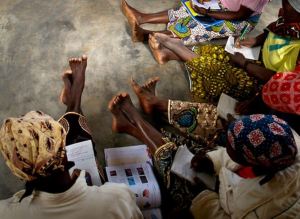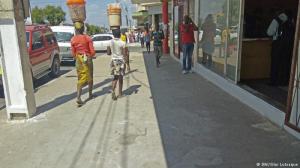Christof Lehmann (nsnbc) : Although it is technically forbidden, poverty drives many children in Mozambique’s Nampula province into trade to help support their families. Now, many of them are complaining of aggressive behavior on the part of the municipal police.
Early in the morning, children from various neighborhoods begin to arrive in Nampula to sell almost anything; Water, fried vegetables, soft drinks, roasted peanuts, and more. Given the poverty that the children face and the fact that about half of Mozambicans – even in 2017 – are illiterate, their and their families’ very survival is at stake when they are “breaking the law” and work as street vendors.
German “Deutsche Welle” spoke with several of them. Sualehe Metarica is 15 years old and has been an informal trader on the streets of Mozambique’s third largest city, Nampula, for years. In the afternoon, as soon as she gets home from her Grade 8 school classes, she is out on the streets selling roasted peanuts.
“I sell to get money to support my studies and eat. I live with my aunt and she also sells,” she explains. The business is not very profitable, but she manages to sell six kilograms a day and make four to six Euros.
The main problem is that local legislation outlaws street trading. When they are caught, the child vendors say they are victims of violence and see their property confiscated without any right of redress. Says Sualehe: ”We sell here [on the street]. [But] the [municipal police] council rips us off our assets and does not give them back to us. I have no place to sell.”
Twelve-year-old Kelvin also says he often has to run from the police. “In the mornings I go to school and in the afternoons I sell peanuts. I come here to the city to sell. They never caught me, because I run away and hide. ”
Nampula Municipal Police declined to comment on allegations of assaulting children. Spokeswoman Mariza Caramacha did however admit that the authorities seized products. “In the first year, [2014] we confiscated the products, and citizens complained. We warned them that they could not go back to the street, and after two months we started not returning products.
”Non-perishable product we store and sell at auction later. Perishable products we destroy immediately,” she said. These measures came into force with the new municipal government led by Mahamudo Amurane and aim to avoid congestion and road accidents by putting an end to informal commerce.
Nampula province governor Victor Borges downplays the problem of child labour, saying, “At this moment, we have no record of many cases [of child labour in the province]”. His emphasis is on prevention. “What we have said is that we need to avoid factors that can contribute to this. For example, we must train children to be ready to enter the labour market when they are old enough. We are doing that and will continue to do so.”
Children constitute 52 percent of the Mozambican population. Child poverty levels are high, and about 22 percent of children between the ages of 7 and 15 work, according to the United Nations Children’s Fund.
Coming mostly from socio-economically under-privileged families many of the child street vendors have difficulties breaking out of poverty because illiteracy and lack of access to education for adolescent illiterates makes it almost impossible for them to obtain an education that could help them and their families to step up on the social ladder.
Speaking on the occasion of International Illiteracy Day in September 2017, Laurino Nhacune, Mozambique’s National Directorate of Literacy and Adult Education, said the government is determined to reduce the illiteracy rate to 41 per cent by 2019. In 1975 when Mozambique gained its independence from Portugal, it was estimated that some 93 percent of Mozambicans were illiterate. By 2017 illiteracy is estimated to have fallen to some 44.9 percent.
“This growth shows the evolution of the literacy services since independence, and now our perspective is to reduce the illiteracy rate to 41 per cent, by the end of this government’s term of office”, said Nhacune.
He said that currently there are 571,000 people attending the literacy centres across the country, who are being taught to read and write by 15,000 volunteers. They receive, not a wage, but an allowance, which amounts to a total of 125 million meticais (just over two million dollars) a year.
The subsidies are extremely low, and certainly do not provide much of an incentive. They are about 650 meticais (about 10.5 US dollars) a month. The province with the highest illiteracy rate, Nhacune said, remains Cabo Delgado in the far north where 60.7 per cent of the population cannot read or write. The lowest rate is 9.5 per cent, in Maputo City.
 According to the United Nations Educational, Scientific and Cultural Organisation (UNESCO), there are 750 million adults in the world who lack even the most basic literacy skills.
According to the United Nations Educational, Scientific and Cultural Organisation (UNESCO), there are 750 million adults in the world who lack even the most basic literacy skills.
Mozambique has since it gained its independence in 1975 been ruled by the socialist Frelimo party. The country went through a 16-year-long civil war between Frelimo and Renamo. The civil war reflected cold-war dynamics. Frelimo was strongly supported by the Soviet Union (USSR), among others.
Renamo was supported by the then Apartheid-ruled South Africa, by the then British colony Rhodesia (now Zimbabwe), former Portuguese oligarchical circles, the United States and other western powers who described Renamo as “rebels and freedom fighters”.
The civil war ended with a ceasefire agreement signed in the Italian capital Rome in 1992, bringing the civil war to an end in 1993. However, the country has never been fully pacified and “peace talks” between the socialist Frelimo government and Renamo are dragging on until today (2017). Ironically, Renamo is still a party represented in parliament and an illegal armed militia.
The situation in Mozambique brings to mind the apparently endless debates about Dukor’s “African Unfreedom” versus those who would rather find causes for African countries’ current situation in the actions and activities of contemporary African leaders, governments, and communities.
Many, especially Frelimo supporters, would argue that the country’s 45 percent illiteracy are a legacy of colonialism and neo-colonialism. Many Frelimo supporters would also argue that the civil war delayed educational programs as well as infrastructure programs needed to accumulate funds and to bring education to the people. Many Renamo supporters would agree with that point, even though both parties would rather blame each other than working together to solve the crisis.
Many supporters of Renamo and other opposition parties would stress the irony that the “socialist” Frelimo has ruled Mozambique since 1975 and the 45 percent of “the average people” are still illiterate while only some 9 percent of the population in the capital Maputo, the hotbed of government, oligarchy, duplicity and corruption, are illiterate.
One might add discussions about “how much police brutality against impoverished children is normal” – or so normal that police can decline and deny. When a debate lacks honesty and constructive approaches aimed to solve problems, why not add another nonsensical topic – right?
The most discouraging fact may be that all of the above mentioned arguments have at least some degree of validity. On the other hand, one might hope that an honest debate about prioritizing party politics and nepotism higher than education and infrastructure might pave the way toward less pathological and more pragmatic, result-oriented policies and projects.
CH/L – nsnbc 19.09.2017
Source Article from https://nsnbc.me/2017/09/19/86257/
 RSS Feed
RSS Feed















 September 19th, 2017
September 19th, 2017  Awake Goy
Awake Goy 











 Posted in
Posted in  Tags:
Tags: 













